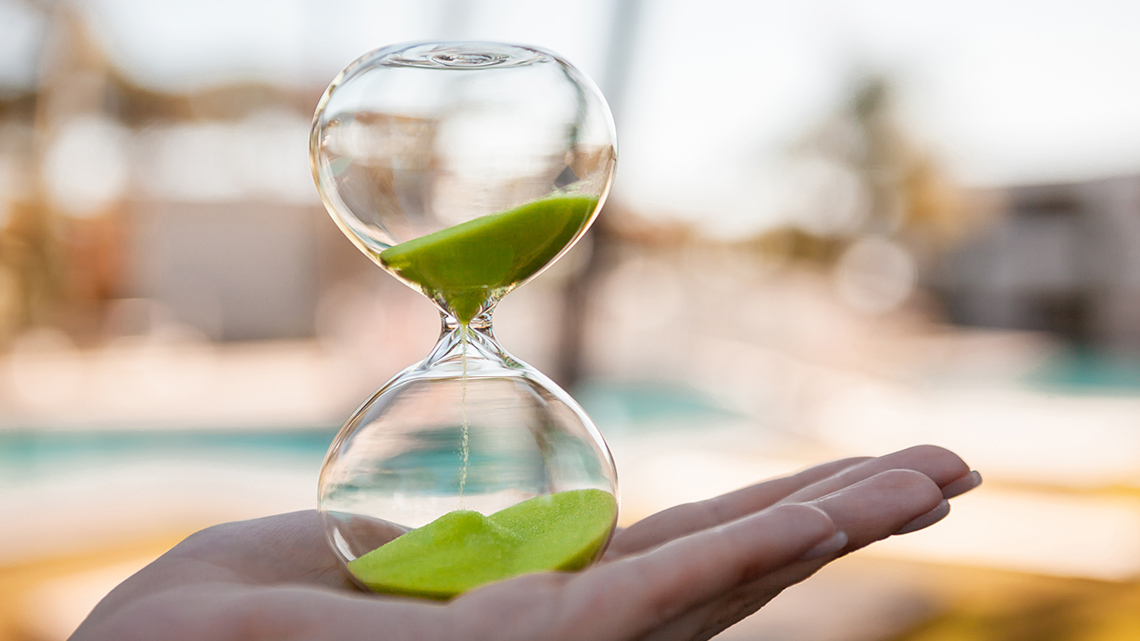Minds On
Imagining the setting
In this learning activity, we are going to travel through time. We will visit the past, the present and the future. Are you ready?
Read the following short description of a Saturday:
Flo’s Saturday
Flo woke up to the sound of her loud alarm clock. It buzzed next to her ear, over and over, and after some time, Flo finally turned it off. She got up from her bed and went straight to the pantry for breakfast. She pulled out a cereal box which had about half marshmallows and half grains, because she felt that she deserved it after her stressful week at school. While eating her cereal, Flo read her favourite book. She finished her cereal, put the bowl in the sink, and brushed her teeth. It was Saturday, so she really did not have much to do. She sat on the couch, turned on the TV, and put on one of her favourite shows. After some time, she fell asleep and woke up hours later when her mom came home from her night shift at the hospital. Flo greeted her mom with a smile. After she changed out of her scrubs, her mom joined Flo on the couch, and they enjoyed a day of TV, movies, and snacks.

Reflect
When you read this story, did you travel to the past, the present, or the future?
How did the choice of words affect whether you thought the story took place in the past, present, or the future? Use examples from the story.
Past tense verbs
If you guessed that you travelled to the past, you are correct. Flo’s actions in the story were written in the past tense. This means that the verbs in the story were used to describe an activity that already happened. For example, “Flo woke up.”
In a small group or with a partner if possible, construct a list of all the verbs used in the story that are in the past tense.
Action
Comparing verb tenses
Verbs (action words) can be written in different tenses to describe something happening in the past, present, or future, depending on the situation.
Student Tips
Past, present, and future
Review the following examples of tenses, with the verb in bold.
| Past Tense | Present Tense | Future Tense |
|---|---|---|
| I liked chocolate. | I like chocolate. | I will like chocolate. |
| My dog ate my homework. | My dog is eating my homework. | My dog will eat my homework. |
| Mona jumped for joy. | Mona is jumping for joy. | Mona will jump for joy. |
| They visited the park. | They are visiting the park. | They will visit the park. |
| I swam for fun. | I swim for fun. | I will swim for fun. |
| The plane arrived at 4pm. | The plane arrives at 4pm. | The plane will arrive at 4pm. |
Practice
Do some time travelling to the past, present and future, and construct three more examples in each tense.

Student Success
Think-Pair-Share
Reflect on each of the following questions on your own.
- What are some things you noticed from the chart of examples?
- Why do some verb tenses have two words in them (eg. “will swim”)?
- Does writing in the present tense always mean the event is happening in the present?
- What questions do you still have about verb tense?
Discuss your answers with a partner, if possible.
Note to teachers: See your teacher guide for collaboration tools, ideas and suggestions.
Writing task: describing your day
Think about a typical day for yourself. What are some usual things that you might have already done? What are you doing now? What are your plans for later today? You are going to write about this day in all three verb tenses (the past, present, and future).
Part 1: Travel to the past
Begin by writing your typical day in one paragraph, as if it already happened. For this learning activity, you can record your ideas using speech to text software, paper, or a computer. When writing, consider these tips:
- You can write about a day that happened to you in the past. This will help you write it in past tense.
- Think carefully about the verb you are using whenever you are describing an action, and make sure it is in the past.
- When you are finished, read over carefully, and revise your text using self-editing strategies like reading out loud. Does it sound like this day has already happened?
Part 2: Travel to the future
Take your paragraph about your typical day, and re-write it, this time as if it will happen in the future. When writing, consider these tips:
- Imagine that you are “planning” for a day that will happen.
- You will likely need to change the verb completely (eg. swam to swim), and you will also likely need to add a word in front (eg. will swim is in future tense). Stop and think about this at every verb you encounter in your original version.
- When you are finished, read over carefully, and revise your work using self-editing strategies like reading out loud. Does it sounds like this day is going to happen in the future?
Part 3: Travel to the present
Once more, you will now rewrite your typical day as if it were happening in the present. When writing, consider these tips:
- Imagine that the events are happening right in the moment you are writing them (eg. I am getting out of bed).
- Choose which paragraph to start from carefully – either the past tense or the future tense. What do you notice about present tense and future tense in the examples we read earlier? How can you use this to help you write the paragraph in the present?
- When you are finished, read it over carefully, and revise your work using self-editing strategies like reading out loud. Does it sound like the day’s events are happening right now?

Consolidation
Analyze your writing

Now you have travelled to the past, present, and future. You have three different paragraphs about the same typical day. Make a space to have all three of them in front of you or in a way that you can easily swap between the three. Answer the following questions about your paragraphs:
- Read over each paragraph again, out loud if possible. Which paragraph sounds the best? Why?
- When might you write using two or more verb tenses in the same text? Provide an example.
- What was one strategy that you found effective when checking the verb tense in your own writing?
- Why does verb tense matter in a piece of writing?
Reflection
As you read the following descriptions, select the one that best describes your current understanding of the learning in this activity. Press the corresponding button once you have made your choice.
I feel...
Now, expand on your ideas by recording your thoughts using a voice recorder, speech-to-text, or writing tool.
When you review your notes on this learning activity later, reflect on whether you would select a different description based on your further review of the material in this learning activity.